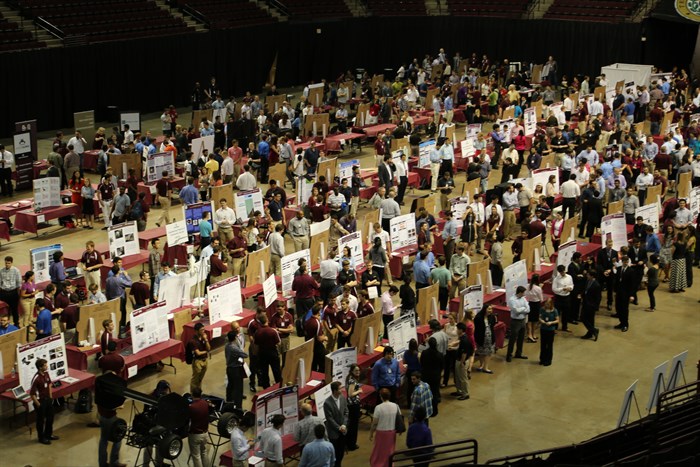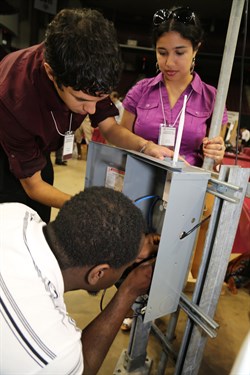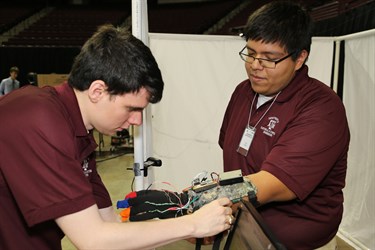 The Dwight Look College of Engineering hosted the second-annual Texas A&M Engineering Project Showcase April 25 in Reed Arena to demonstrate and display the diverse projects in the college and exhibit the ways in which engineers build solutions that solve real-world problems.
The Dwight Look College of Engineering hosted the second-annual Texas A&M Engineering Project Showcase April 25 in Reed Arena to demonstrate and display the diverse projects in the college and exhibit the ways in which engineers build solutions that solve real-world problems.
More than 150 engineering teams participated with posters and prototypes representing the work of more than 600 undergraduate engineering students, representing a 50 percent increase from last year’s Showcase. The student participants presented work from Senior Capstone Design courses, AggiE-Challenge projects, technical electives, undergraduate research projects, Startup Aggieland companies, freshman design teams and others.
The event brought more than 140 industry representatives from 60 companies to campus, which is nearly a 50 percent increase in companies that attended compared to last year. The Showcase provided them with the opportunity to discuss possible collaborations for future industry-sponsored projects with undergraduates and faculty.
Before the Showcase began, industry representatives were invited to tour Texas A&M engineering facilities or exhibits. The tours included the Texas Center for Applied Technology – Mobile Healthcare, the Engineering Innovation Center, the Mary Kay O’Connor Process Safety Center, Rescue Robotics, and Unmanned Air Vehicles. Following the tours, industry representatives were invited to a luncheon before the start of the event.
“As one of the largest engineering schools in the country with top-educated engineering graduates, we are often asked about how industry can engage with our students,” Magda Lagoudas, executive director of industry and nonprofit partnerships said. “This is a wonderful opportunity to bring in industry to see the engineering abilities of our students as well as their innovative side. The Showcase was created to provide that opportunity to our students and industry.”
 Many students felt that the Showcase was a unique opportunity to show off their work to fellow students, faculty and industry. For those unable to attend the Showcase, the event was live-streamed by KAMU.
Many students felt that the Showcase was a unique opportunity to show off their work to fellow students, faculty and industry. For those unable to attend the Showcase, the event was live-streamed by KAMU.
“We are very excited. It’s good to spend as much time on a project and actually having it finished and showing it off to everybody,” Joseph Dardar IV, senior electronic systems engineering technology major, said. “People seem really interested, which makes us feel even more excited to display it.”
An awards ceremony at the end of the Showcase recognized the top teams in the Showcase.
The first-place Student Design Team award ($700) went to the Formula SAE – Electrical team. The team member was Brent James Bauer (mechanical engineering) and the faculty mentor was Dr. Make McDermot.
The second-place Student Design Team award ($500) went to the Formula SAE – Aerodynamics teams. Team members were John Mayo (mechanical engineering), Alexandro Monjaraz (aerospace engineering) and Marco Martinez (mechanical engineering). The faculty mentor was Dr. Make McDermot.
The third-place Student Design Team award ($250) went to the Putting on the Brakes: Engineering Oil Transportation team. Team members were Coleman Fincher (mechanical engineering), Daniel Jaeger (mechanical engineering) and Storm Rubio (computer engineering).
The first-place AggiE-Challenge team award ($750) went to the Noble-metal-nano particle- catalyzed PEDOT: PSS/carbon composite electrode for aqueous lithium-ion batteries team. Team members were Dion Hubble (chemical engineering), Raul Calzada (chemical engineering), Deepak Bhatia (electrical engineering), Aalap Ashtamkar (mechanical engineering), Sergio Cartagena (mechanical engineering), Aaron Morales (mechanical engineering) and Xingliang He (mechanical engineering). The faculty mentors were Dr. Hong Liang and Dr. Partha Mukherjee.
The second-place AggiE-Challenge team award ($500) went to the DNA to Go: Portable, Low-cost PCR-based Diagnostic Assays team. Team members were Yuanpeng Bi (chemical engineering), Mauricio Coen Moraga (chemical engineering), Danielle Cope (chemical engineering), Miguel Carpio (chemical engineering), Jacob Harris (electrical engineering), Richard Lim (chemical engineering), James Johnson (chemical engineering), Stanley Lu (biomedical engineering), Alex Millard (chemical engineering), Adriano Pangelinan (chemical engineering) and Neal Patel (chemical engineering). The faculty mentor was Dr. Victor Ugaz.
The third-place AggiE-Challenge team award ($250) went to the Low Cost Spectrophotometer team. Team members were Claire Kalkbrenner (biomedical engineering), Andrew Van (biomedical engineering), Jeffrey Smith (biomedical engineering), Stanley Lu (biomedical engineering), Edwin Xiao Cai (biomedical engineering), John Paul Hernandez Alcala (biomedical engineering) and Karla Gonzalez (biomedical engineering). The faculty mentor was Dr. Kristin Maitland.
The first-place Capstone team award ($700) was Seawater Desalination Plant – Power team. Team members were Mohannad Hani Mohamed (mechanical engineering) and Kamel Mohamed (mechanical engineering). Faculty mentors were Dr. Dan McAdams and Dr. Michael Schuller.
The second-place Capstone team award ($500) went to the Personal Lung Fluid Analyzer team. Team members were Eric Gros (biomedical engineering), Michael Holtzclaw (biomedical engineering), Zachary Paulson (biomedical engineering), Ana Flores (biomedical engineering), Phillip Simpson (biomedical engineering) and Sandeep Kancharla (biomedical engineering). Faculty mentors were Dr. Michael McShane, Dr. Duncan Maitland and Dr. Alan Brewer.
The third-place Capstone team award ($250) went to the High-Throughput Histoglical Analysis (AustoHistoBot) team. Team members were Jared Newton (biomedical engineering), Ritvik Bansal (biomedical engineering) and Austin Smith (biomedical engineering). Faculty mentors were Dr. Michael McShane and Dr. Mary McDougall.
The first-place Undergraduate Research team award ($700) went to the Design and Characterization of an Endovascular Mechanical Thrombectomy Device team with Jason Szafron (biomedical engineering). Dr. Duncan Maitland was the mentor for the project.
The second-place Undergraduate Research team award ($500) went to the Brillouin Microscopy- Use and Potential Applications with Zach Steelman (biomedical engineering). Dr. Vlad Yakovlev was the mentor for the project.
The third-place Undergraduate Research team award ($250) went to Using Ultrashort Pulsed Lasers to Understand and Physically Model Embryonic Brain Development with Brian Kelly (biomedical engineering). The faculty mentor for the project was Dr. Alvin Yeh.
The first-place General team award ($700) went to Visit, a Startup Aggieland Company, with Derek Burgman and Nando Luna.
The second-place General team award ($500) went to the Communication Network in Remote Areas team. Team members were Chokote Kamdeu (mechanical engineering), Jeremy Cantu (computer science), Janice Rosado (computer engineering) and Melissa McNeil (computer science). The faculty mentors were Dr. Richard Furuta and Rodney Boehm.
The third-place General team award ($250) went to the TrialsConnect team. Team members were Chun-Wen Chen, Ying-Po Liao (ocean engineering) and Ya-Chieh Hsu.
The first-place TEES Commercial Ready team award ($700) went to the Modular Integrate Stackable Layers (MISL) team. Team members were Kelson Astley (engineering technology), Tanner Perkins (engineering technology) and Ty Navarrete (electronic systems engineering technology). The faculty mentor was Dr. Joseph Morgan.
The second-place TEES Commercial Ready award ($500) went to the Low Energy Heat Recover Ventilator team. Team members were Colin Breedlove (mechanical engineering), Matt Krezinski (mechanical engineering), Joe McDonough (mechanical engineering) and James Thorpe (mechanical engineering). The faculty mentors were Dr. Charles Culp and Dr. Devesh Ranjan.
The third-place TEES Commercial Ready award($250) went to the Mobile Behavioral Health Monitoring System team. Team members were Kaci DeCock (biomedical engineering), Boang Liu (biomedical engineering), Cameron Schaefer (biomedical engineering), Joshua Silveus (biomedical engineering) and Harrison Smith (biomedical engineering). Faculty mentors were Dr. Javier Jo, Mr. John Hanks and Dr. Michael McShane.
The event was sponsored by the Dwight Look College of Engineering, Spectra Energy, Texas Instruments and Emerson. For more information about the event, visit engineering.tamu.edu/project-showcase. For project sponsorship information, please contact Magda Lagoudas, executive director, industry and nonprofit partnerships, at m-lagoudas@tamu.edu.